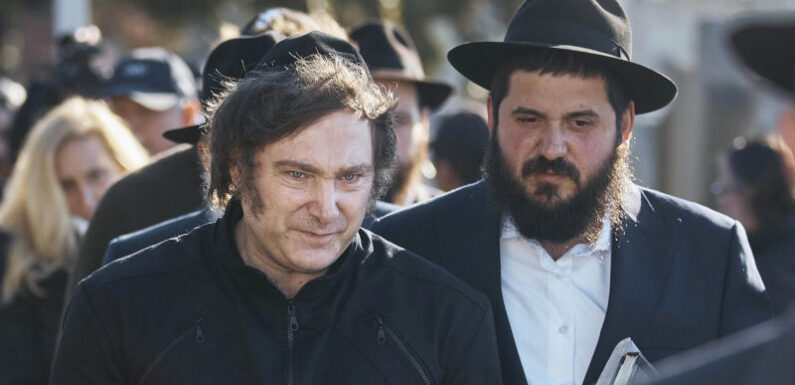
Save articles for later
Add articles to your saved list and come back to them any time.
Buenos Aires: Javier Milei’s incoming administration is shaping up to be one of the most pro-Israel governments in Argentina’s history, at a time when other Latin American nations have spoken out against Prime Minister Benjamin Netanyahu’s strategy to eradicate Hamas.
A week after winning the November 19 run-off election, Milei arrived in New York on Monday for his first trip abroad as president-elect and headed straight to the tomb of famous orthodox rabbi Menachem Mendel Schneerson’s grave to pay respects, wearing a kippah and all-black outfit.
Javier Milei speaks after winning the Argentinian presidential election earlier this month.Credit: Getty
The symbolic gesture illustrates how committed the incoming leader is to deepening Argentina’s cultural and political ties with Israel, while much of South America, a Catholic stronghold, remains neutral or even critical.
Milei went to the grave site before any other meetings with US officials or the International Monetary Fund in Washington.
The president-elect is converting to Judaism, as per one of his spokespersons, and on Saturday participated in a Jewish ceremony in Buenos Aires where he received a blessing from another rabbi.
Less than two weeks before he takes office and without a full cabinet in place, he called the US visit a “spiritual” trip, his second since early September. It remains unclear when or why Milei, who grew up Catholic, chose to convert.
Argentina’s president-elect, Javier Milei, centre, leaves after praying next to rabbis at the resting place of Rabbi Menachem Mendel Schneerson in New York.Credit: AP
The incoming president’s fervently pro-Israel stance singles out Argentina, already home to the region’s largest Jewish population, as Israel’s top ally in Latin America. Milei has repeatedly said he plans to visit the country and move Argentina’s embassy to Jerusalem from Tel Aviv.
At the same time, he’s only starting to smooth over relations with Pope Francis, who is Argentinian, after previously heaping criticism on him while running as a candidate.
While Argentina has traditionally sustained good relationships with Israel – outgoing President Alberto Fernandez picked the Middle Eastern nation for his first international trip as head of state in January 2020 – Milei’s approach contrasts with increasing criticism from South America’s leftist leaders over Israel’s offensive in the Gaza Strip.
Earlier this month, Colombian President Gustavo Petro threatened to suspend diplomatic ties after Israeli officials called some of his comments antisemitic, while Chilean leader Gabriel Boric temporary pulled his ambassador from the Jewish state to protest its attack in Gaza.
The hard-left government of Bolivia cut off diplomatic relations with Israel altogether, accusing it of “crimes against humanity”. Brazil’s Luiz Inácio Lula da Silva has taken a more neutral approach, though he too has criticised Israel’s response.
The new president’s strategy comes when stakes are high: Hamas took up to 21 Argentinians hostage after its October attack in Israel, one of the largest nationalities involved in the assault. Five Argentinian captives were among the 11 hostages being freed from Gaza on Tuesday (AEDT).
To some observers, Milei’s support for Israel represents more a tilt than a shift in the country’s existing policy.
Javier Milei, centre, prays next to Chabad-Lubavitch rabbis. His representatives said he was converting to Judaism.Credit: AP
“His personal passion on the issue, his strong person beliefs, let us anticipate that Argentina’s support for Israel will intensify,” Juan Cruz Diaz, managing director of Buenos Aires consultancy Cefeidas Group, said. “We’re talking more about continuity than disruption.”
Bloomberg
Get a note directly from our foreign correspondents on what’s making headlines around the world. Sign up for our weekly What in the World newsletter.
“Terms of the Israel-Hamas ceasefire”
- All fighting in Gaza halts for four days.
- Hamas will release 50 women and children held as hostages.
- In exchange, Israel will release 150 Palestinian women and children from jail.
- The truce deal will allow hundreds of trucks of humanitarian, medical and fuel aid to enter Gaza.
- Israel to extend truce by an extra day for every additional 10 hostages released by Hamas.
More coverage of the Hamas-Israel conflict
- Hamas had bigger plans on October 7: Intelligence about Hamas’ motivations reveals an intention to strike a blow of historic proportions and provoke an overwhelming Israeli response.
- Escape from chaos: An Australian father faced a heartbreaking dilemma – whether to flee Gaza to his children, or stay with his wife.
- Open letters: Mass resignations, boardroom turmoil and angry donors are some of the ways the Israel-Hamas war is filtering down into Australia’s high-powered arts world.
- Gaza’s youth: One of the cruellest ironies of war is that they are never started by children, yet it is children who suffer the most.
Most Viewed in World
From our partners
Source: Read Full Article


